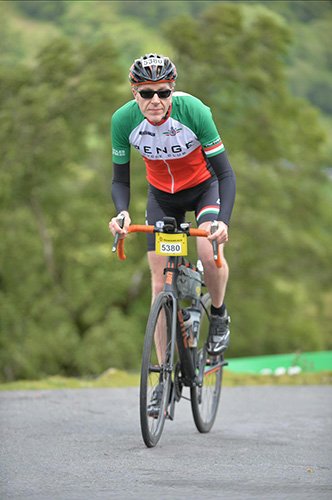The family of an experienced endurance cyclist who died from heat stroke and dehydration after taking part in an amateur cycling championship, has welcomed a new UCI protocol to protect riders in high temperatures.

Barry ‘Baz’ Covington, 36 from Penge, collapsed while competing in the 155 Km UCI Gran Fondo Amateur World Championships which took place in Albi, Languedoc in the south of France in August 2017. He sadly died in hospital a week later.
The race took place in a heat wave, with temperatures reaching up to 39°C.

Following the event there were complaints about the lack of volunteers to staff the feeding stations and a shortage of water or any form of hydration. Participants resorted to picking up discarded bottles at the roadside to look for dregs or relying on the kindness and generosity of spectators to offer them drinks.
On the grounds of negligence and a breach of duty/ contract, the family of Barry Covington instructed Hugh James law firm to take action against AXA France, the public liability insurers of UCI.

The claim has now been resolved with the family receiving a significant six figure sum.
Barry’s family has released the following statement:
“While the tragic loss of our beautiful Baz will forever be felt, we find solace in the positive outcome from our legal proceedings and the recent changes to the UCI’s heat protocol. These new rules stand to safeguard riders in high temperatures during all future events.”

Rebecca Gilmore from Hugh James’ Specialists Claims team said;
“The real satisfaction after working on this case for so long and supporting the family over many years comes not only from the significant settlement sum but the fact that we have potentially brought about real positive changes to support rider safety in the future.”
James Hanscomb, Chair of Penge Cycle Club, said;
“Barry is still a celebrated legend at Penge CC, for his incredible feats of endurance and for being a delightful, warm friend. Two positive outcomes have come from Barry’s death: one is that we now count his extended family as firm friends. The other is that the UCI has now made the necessary changes to ensure better rider safety at events. Those positives don’t come close to making up for the loss of our friend, but we are all delighted to hear of the success of this campaign.”

UCI, cycling’s global governing body, will be presenting its new high-temperature protocol to “reduce the risk of heat-related accidents” for approval at the UCI Management Committee later this month.
Under the protocol a panel will be able to make recommendations to event organisers when potential risk is identified, based on real-time weather reports.
This may include moving start zones to shaded areas, supplying teams with cold drinks and crushed ice during the race, increasing the number of refuelling motorbikes and altering the start time.


